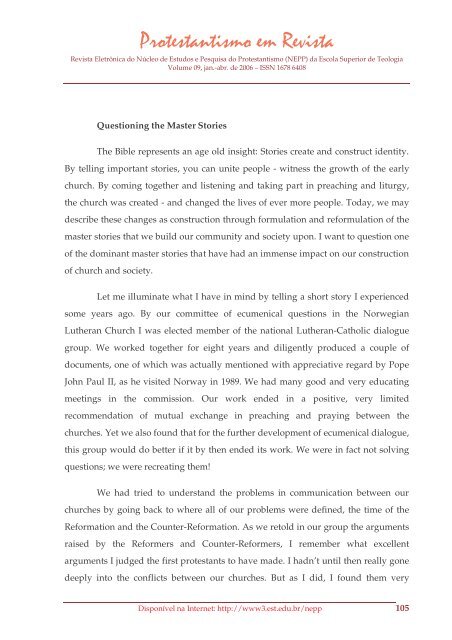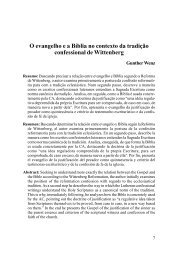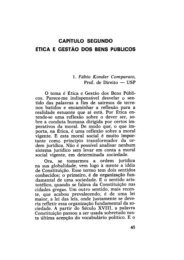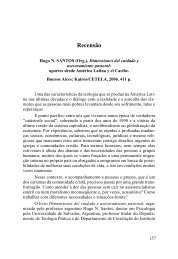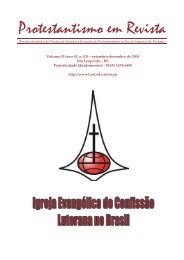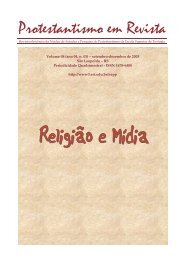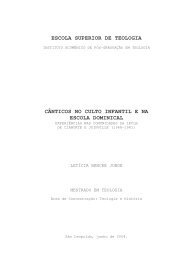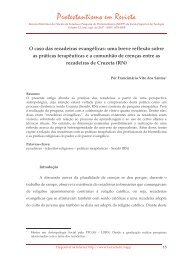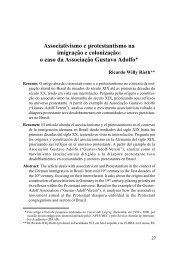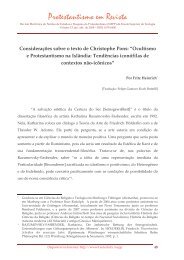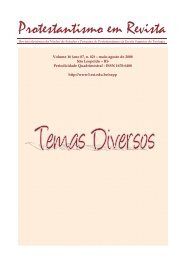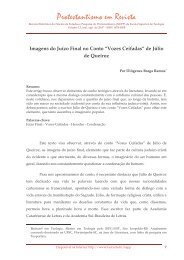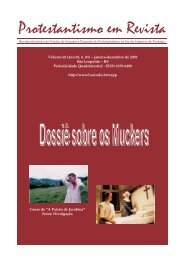Protestantismo em Revista, volume 09 (Ano 05, n.1) - Faculdades EST
Protestantismo em Revista, volume 09 (Ano 05, n.1) - Faculdades EST
Protestantismo em Revista, volume 09 (Ano 05, n.1) - Faculdades EST
You also want an ePaper? Increase the reach of your titles
YUMPU automatically turns print PDFs into web optimized ePapers that Google loves.
<strong>Revista</strong> Eletrônica do Núcleo de Estudos e Pesquisa do <strong>Protestantismo</strong> (NEPP) da Escola Superior de TeologiaVolume <strong>09</strong>, jan.-abr. de 2006 – ISSN 1678 6408Questioning the Master StoriesThe Bible represents an age old insight: Stories create and construct identity.By telling important stories, you can unite people - witness the growth of the earlychurch. By coming together and listening and taking part in preaching and liturgy,the church was created - and changed the lives of ever more people. Today, we maydescribe these changes as construction through formulation and reformulation of th<strong>em</strong>aster stories that we build our community and society upon. I want to question oneof the dominant master stories that have had an immense impact on our constructionof church and society.Let me illuminate what I have in mind by telling a short story I experiencedsome years ago. By our committee of ecumenical questions in the NorwegianLutheran Church I was elected m<strong>em</strong>ber of the national Lutheran-Catholic dialoguegroup. We worked together for eight years and diligently produced a couple ofdocuments, one of which was actually mentioned with appreciative regard by PopeJohn Paul II, as he visited Norway in 1989. We had many good and very educatingmeetings in the commission. Our work ended in a positive, very limitedrecommendation of mutual exchange in preaching and praying between thechurches. Yet we also found that for the further development of ecumenical dialogue,this group would do better if it by then ended its work. We were in fact not solvingquestions; we were recreating th<strong>em</strong>!We had tried to understand the probl<strong>em</strong>s in communication between ourchurches by going back to where all of our probl<strong>em</strong>s were defined, the time of theReformation and the Counter-Reformation. As we retold in our group the argumentsraised by the Reformers and Counter-Reformers, I r<strong>em</strong><strong>em</strong>ber what excellentarguments I judged the first protestants to have made. I hadn’t until then really gonedeeply into the conflicts between our churches. But as I did, I found th<strong>em</strong> veryDisponível na Internet: http://www3.est.edu.br/nepp 1<strong>05</strong>


